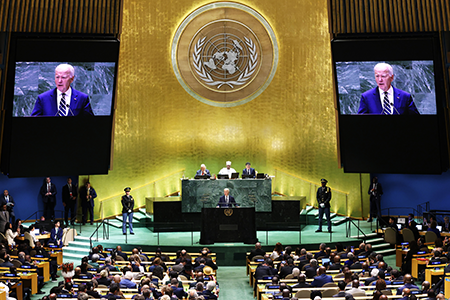“We continue to count on the valuable contributions of the Arms Control Association.”
Confronting the Threats Posed by Threats of Nuclear Use
November 2024
By Daryl G. Kimball
In September, UN member states adopted an important, wide-ranging document designed to reaffirm the UN Charter, reinvigorate multilateralism, boost implementation of existing commitments, and advance concrete solutions to global challenges, including the existential threats posed by nuclear weapons.

In the “Pact for the Future” document, UN member states expressed their “deep concern” over the state of nuclear disarmament and reaffirmed support for the common goal of a world free of nuclear weapons and for the fulfillment of respective nuclear disarmament obligations and commitments in the nuclear Nonproliferation Treaty (NPT) and elsewhere. They also agreed on the need to “take all steps to prevent nuclear war.”
UN Secretary-General António Guterres emphasized that the pact represents the “first agreed multilateral support for nuclear disarmament in more than a decade.”
At a time of unprecedented geopolitical division and severe challenges to the five core nuclear norms (no nuclear use, no threats of use, no nuclear testing, no nuclear weapons buildups, and nonproliferation), the pact represents an important breakthrough that all states, particularly the United States, must build on through specific, sustained actions.
Most urgently, as Russian leaders continue to warn that they may resort to using nuclear weapons if the United States or other allies of Ukraine cross Russia’s increasingly fuzzy redlines for nuclear use, all states need to fulfill their pledges to “make every effort” to avert the danger of nuclear war.
Russian President Vladimir Putin’s full-scale invasion of Ukraine and his warnings of possible nuclear weapons use in response to non-nuclear threats have raised the specter of a nuclear conflict in ways not seen in the post-Cold War era. If nuclear weapons are used, even on a “limited” scale, in a conflict involving nuclear-armed adversaries, there is no guarantee that they would not trigger nuclear escalation with catastrophic global consequences.
In 2017, U.S. Vice President Joe Biden said, “[I]t’s hard to envision a plausible scenario in which the first use of nuclear weapons by the United States would be necessary or make sense.” During his 2020 presidential campaign, Biden pledged to adopt a policy that states that the “sole purpose” of nuclear weapons is to deter nuclear weapons use.
Unfortunately, once Biden was in the White House, his 2022 Nuclear Posture Review fell short of his pledges. As with Russia’s formal nuclear weapons declaratory policy, Biden’s policy retains the option of using nuclear weapons to respond to non-nuclear threats under extreme circumstances.
Biden and his successor have a duty to do more to reinforce the global norm against nuclear weapons use. Rather than trying to distinguish between what it calls Russia's irresponsible nuclear threat rhetoric and its own “defensive” nuclear deterrence signaling, the United States should join non-nuclear-weapon states who condemn nuclear use and threats of nuclear use of any kind as dangerous, disproportionate, illegal, and as the Group of 20 leaders said in 2022 and 2023, “inadmissible.”
In addition, the next U.S. president should take overdue steps to extend legally binding guarantees against nuclear attack against NPT non-nuclear-weapon states-parties. The United States has signed but not ratified the protocols to the South Pacific, African, and Central Asian nuclear-weapon-free-zone treaties, which commit the major nuclear-armed states to extend negative nuclear security assurances to the zone states.
For more than a decade, the Senate has failed to advance formal consideration of the protocols to these three treaties, making the United States the only nuclear-weapon state and NPT signatory that has failed to do so. In light of Russia’s full-scale invasion of Ukraine and Putin’s repeated threats of nuclear use, the United States finally must act to bring into force the protocols’ legally binding assurances against the threat or use of nuclear weapons.
The president also has a duty to support serious efforts to underscore that the uniquely catastrophic dangers of nuclear war must be avoided. For example, Washington should actively support a new UN General Assembly resolution advanced by Ireland and New Zealand that seeks to establish a panel of 21 scientific experts to conduct a new study on the potential effects of nuclear war. It seeks to respond to growing calls from scientific bodies and organizations from around the world for a comprehensive, up-to-date understanding of such impacts.
This resolution would provide serious new analysis and information about why a nuclear war cannot be won and must never be fought and would create new impetus for overdue action on nuclear disarmament. As Biden noted in his statement congratulating the Japan Confederation of A- and H-Bomb Sufferers Organizations, Nihon Hidankyo, for winning the 2024 Nobel Peace Prize, “[T]he catastrophic human toll of nuclear weapons [is a] story that humanity needs to hear.”
Given that the risk of nuclear war is greater than at any point since the Cold War, the United States, along with other responsible states, must lead the way to reinforce the taboo against nuclear weapons use and threats of nuclear weapons use.
